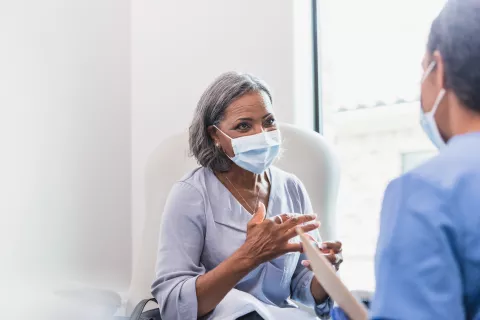
It’s true that men are less likely than women to visit a doctor. They’re also more likely to skip routine health screenings. But getting through the door of a doctor’s office – even for a short visit like a checkup or screening – can be so important for a man’s overall health and longevity.
If you’ve been avoiding the doctor, or you love someone who has, here are three tips from Luminis Health physicians.
Three tips to turbocharge your health
Know when to schedule checkups
It’s always a good idea to schedule a checkup when something isn’t feeling right. If you’ve had a sudden change in weight, problems sleeping or are experiencing sexual dysfunction, for example, it’s time to get an appointment on the calendar.
And get in the habit of annual visits, if you’re not already doing that. While yearly checkups are helpful for men of all ages, they’re especially important for those over age 50. During your appointment, your doctor will do routine checks, such as:
- Blood pressure
- Blood sugar
- Cholesterol
- Physical exam
Keeping an eye on your stats can help you prevent or manage minor problems before they turn into significant health issues such as heart disease, which is the leading cause of death for men.
While at your appointment, you can also talk about any mental health issues you’re facing or discuss any changes in your mood. Mental health is closely tied to physical health, and your physician is a good resource to connect you with help when you need it.
Understand the importance of cancer screenings
Your cancer risk over your lifetime depends on a variety of personal factors. When you reach the age of 40, or earlier if you have a family history of cancer, it’s crucial to talk to your doctor about which cancer screenings are right for you. Early intervention routinely saves lives – for example, the number of people diagnosed with and who die from colorectal cancer is dropping, due in part to more people getting screened and improved treatments.
Colorectal cancer
While many men wouldn’t list “getting a colonoscopy” at the top of a list of things they’re excited about this year, think of it this way: even for advanced colorectal cancers, a 95% cure rate is possible, so screening is important.
By the time you’re 45 (or earlier if you have a family history), talk to your provider to learn when you should get your first screening. You can also talk about alternative screening methods that may be an option for you, such as those that use a stool sample.
Learn more about preventing colorectal cancer.
Prostate cancer
Advice on prostate cancer screening isn’t as straightforward. Current screening methods haven’t been shown to lower the risk of dying from this cancer, according to the American Cancer Society, and could potentially lead to overdiagnosis or overtreatment.
Talk to your doctor when you’re 50 about the benefits and risks of screening and treatment, including getting the PSA (prostate-specific antigen) blood test. Start the conversation earlier if you have increased risk factors, including if you are African American or have a family history.
Learn more about prostate cancer screening.
Take charge with preventive measures
When you want to start practicing some healthier habits, think about your daily lifestyle choices. It’s never too late to kickstart a new routine that helps you get stronger and take better care of your body.
- Get moving. Aim for at least 150 minutes (2.5 hours) of moderate-intensity aerobic activity a week, according to the American Heart Association. It’s even better if you can spread out your exercise over the week and add in strength training on at least two days.
- Make healthy food choices. Eat a variety of nutritious, wholesome foods. If you’re having trouble getting started, ask your doctor to connect you with a nutritionist.
- Quit unhealthy habits. If you smoke, now’s the time to stop. Avoid drinking excess alcohol. And if you’ve been skipping sleep, remember that the effects of poor sleep can affect other areas of your life. Aim for at least seven hours or more a night.
All these small choices can add up to a lifestyle that helps you prevent serious health issues as you get older. Bottom line: your health is too important to put on the back burner this year.
This post was originally published for the Enquirer-Gazette.
Learn more and schedule your appointment at: https://www.luminishealth.org/en/services/primary-care?language_content….



